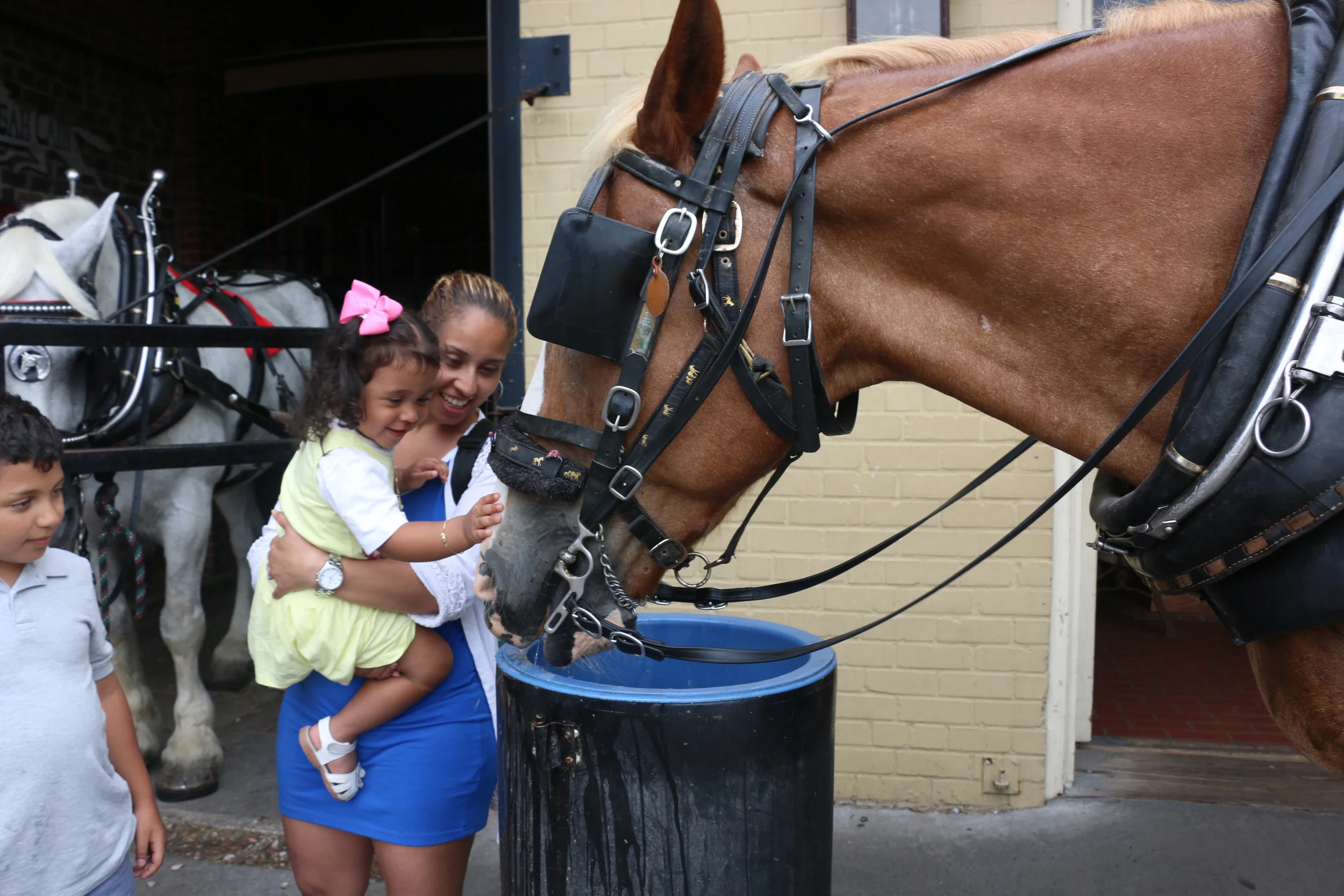Frequently Asked Questions
Below are answers to some to some of the topics we are most frequently asked about:
Work Hours & Off Days
Animals average five tours per day. This means they work five hours each day and have off for 19 hours.
Animals have a minimum 15 minute break between each tour.
Animals average 2 days off each week.
At a minimum, for every four months of work, animals have two weeks off.
Health & Wellness
Our animals are checked by a veterinarian at least three times per year. They are checked twice by a company vet and once by a city inspecting vet.
We protect our animals hooves from the pavement through the use of rubber horse-shoes. The rubber horse-shoes do three things: They elevate the animals’ feet from the pavement, provide a cushion from the hard surface, and give the animal better traction.
Our animals are fed a meal twice a day. Their meals include a grain ration along with nutritional supplements. Our animals are also supplied with a steady flow of hay each day.
Horses rest standing up, so when you see a horse on the street resting, it is basically taking a nap while standing up.
Temperature
We take every single one of our animal’s temperature before and after every single tour, regardless of ambient temperature.
If an animal's temperature exceeds 102.9°, we immediately pull that animal from service.
This means we are constantly checking our animals, individually, to ensure they are at a safe working temperature.
The normal temperature of working animals is from 99°-104°
As a safeguard, we only allow our animals to work up to 103°
Typically, we see temps in the 99°-102.5° range on our touring animals
When the ambient temperature reaches 95° degrees of the heat index reaches 110°, carriage tours are halted.
There has never been a heat-related incident involving a carriage horse in Charleston.
Transparency
All of our barns are open during working hours and our staff is more than willing to take people through our barns and introduce you to our horses. We love to answer questions and share what we do.
Driver Requirements
In order to drive for our companies, you must complete a rigorous training requirement and meet certain requirements.
Preliminary requirements include:
Valid Drivers License
City of Charleston tour Guide License
Reaching necessary level of proficiency in driver training program
Driver Training
A new driver gets teamed with a current driver
The new driver begins by riding tours with the current driver, who becomes the new driver’s mentor. Next, the new driver gives talking tours while the current driver is driving. When the new driver becomes proficient in talking, he or she will then drive while the mentor is talking.
As soon as the new driver is cleared in both talking and driving, the mentor will go on a few tours with the new driver before he or she begins “soloing.” Some people don’t make the cut.
Horse Training
Typically, when we start out with a new horse, we drive them at our farms to teach them our commands and directions. We need to get used to them and they need to get used to us.
We drive them on the roads around the farms so they get used to cars and noises, in a more rural area first.
Then we take them downtown and they drive around with empty carriages and two drivers for as many days as it takes until drivers and managers ensure they are safe and comfortable.
Then they are cleared to take out tours. The horse has two drivers, just like driver training, until the point that we feel horse is comfortable
We ensure that our horses see every possible route and distraction before we allow them to go on tours- this means over 100 hours of training from the farms to the downtown streets before passengers can ride with a horse.
Accidents
On average, the chance of an accident occurring during a ride is less than one in 12,000. This is based on statistics from The City of Charleston, who closely monitors the welfare of the animals and the overwhelming majority of incidences are very minor.
Local and Family-Owned
Each CARES member company is owned and operated by local Charleston families.
Tourism
The 2015 Charleston Area Visitor Intercept Survey indicated that on a survey of 661 random visitors to Charleston, 210 took a horse-drawn carriage tour, which makes up 31.8% of the random sample. That makes the horse-drawn carriage tour the number one activity for visitors to Charleston. The number two activity was a walking tour, which 188 people took (28.4%).
Charleston CARES member companies engage in fundraising, volunteer, and support activities for a range of local community organizations, including HOPE Acres, LEARN Horse Rescue, One80 Place, and Our Lady of Mercy Community Outreach.

